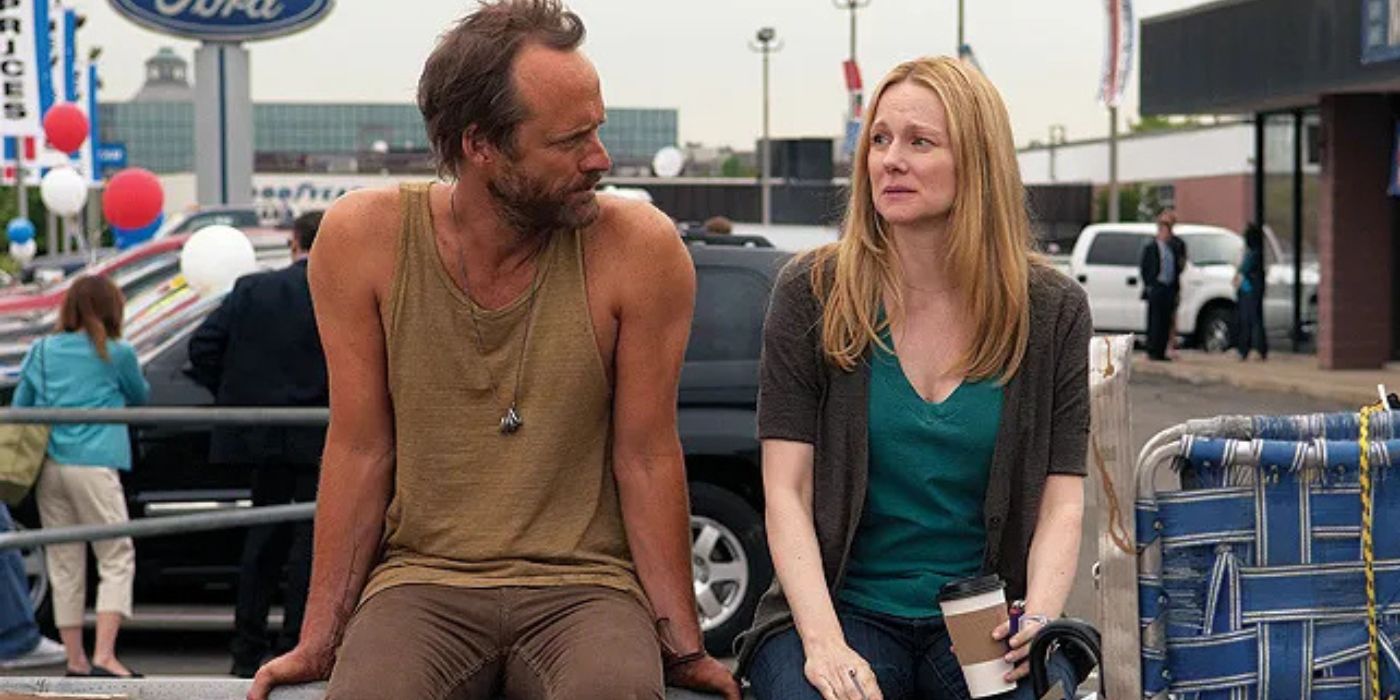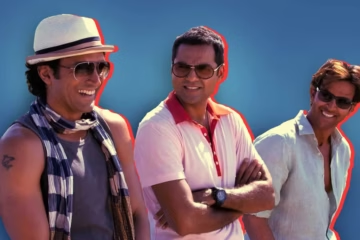The Big C is a frank, often humorous look at a woman whose stage IV diagnosis upends her life and makes her realize she’s been merely existing instead of truly living.
So you’ve binged Dying for Sex and found yourself laughing and crying at a woman’s quest for fulfillment in the shadow of terminal cancer. Now you’re asking: Where do I go from here? Look no further than The Big C.
It might feel like an odd time to seek out another touching-yet-funny exploration of terminal illness after you’ve finished Wondery’s Dying for Sex podcast, but fear not — there’s another series out there that expertly blends humor and heartbreak against the backdrop of a life-altering cancer diagnosis. While it may not offer the exact same first-person intimacy, The Big C, a Showtime dramedy led by the inimitable Laura Linney, is every bit as heartfelt and irreverent, with all the ingredients you loved about Dying for Sex. From taboo-shattering humor to deeply personal reflections on mortality and relationships, this overlooked gem deserves a fresh look.
‘The Big C’ Is More Similar to ‘Dying for Sex’ Than ‘Breaking Bad’

When The Big C premiered on Showtime, it was easy to see why it might be categorized alongside other shows about cancer, most often, Breaking Bad. But where Breaking Bad turned an ordinary chemistry teacher into a criminal mastermind, The Big C takes a decidedly more personal — and frankly, more comedic — approach to its heroine’s final chapter.
In that sense, the series is closer in spirit to the raw, revealing candor of Dying for Sex, in which a woman diagnosed with Stage 4 breast cancer embarks on a journey of sexual exploration.
Just like Dying for Sex shifted the conversation from quietly grieving a terminal diagnosis to confronting it head-on (often with a laugh), The Big C follows Cathy Jamison (Linney), a buttoned-up suburban mother, as she navigates her Stage 4 melanoma diagnosis. Instead of a crime spree, Cathy’s “bucket list” leads her to do the shocking and unexpected, from installing a brand-new swimming pool in her yard on a whim to breaking social conventions that once kept her in check. Both series show how a terminal illness can liberate someone from the constraints of polite, everyday life.
Also Read: The Story Behind ‘Jab We Met’s’ Surprising Success
‘The Big C’s Story Continuously Unfolds With Multi-Layered Characters

Over the course of four seasons, The Big C introduces a gallery of complex personalities who each experience Cathy’s diagnosis differently. Her husband, Paul (played by the hilarious Oliver Platt), is a lovable but flawed partner who frequently swings between comedic meltdown and genuine emotional depth. Like the best friendships featured in Dying for Sex, their marriage runs the gamut from heartbreak to hilarity, illuminating how a shared crisis can expose both the best and worst sides of people.
Cathy’s son, Adam (Gabriel Basso), presents a teen’s perspective on a dying parent: at times detached, at times desperate for connection. Meanwhile, her eccentric brother, Sean (John Benjamin Hickey), battles mental health issues that Cathy tries to fix, even as her own body is failing. Gabourey Sidibe, in a breakout role far removed from the somber tone of Precious, plays Cathy’s opinionated student Andrea, who refuses to grant her teacher any special treatment just because she’s sick. The result is a richer, more layered ensemble than you’d expect from a series pitched as a “cancer comedy.”
Where Dying for Sex used frank discussions of sex to puncture the gloom surrounding terminal illness, The Big C leans on comedic escapades, sly sarcasm, and a willingness to poke fun at life’s most serious moments. Even side characters — from the cantankerous neighbor, Marlene (Phyllis Somerville), to Cathy’s flirty fellow patient Lee (Hugh Dancy) — challenge or encourage Cathy in ways that go beyond the usual “cancer narrative.” Each character has a stake in how Cathy lives her remaining days, and the show’s surprising humor coexists with a tender, authentic look at terminal illness.
‘The Big C’ Depicts a Comedic Approach That Directly Challenges the Taboos of Dying

Part of what made Dying for Sex so innovative was its unabashed approach to often-taboo topics, like how a terminal diagnosis can alter a person’s perspective on intimacy and pleasure. The Big C similarly defies the expectation that any story about cancer must be defined by sorrow and stoicism. When Cathy decides she’s had enough of playing by others’ rules, she aims to live the life she never allowed herself before her diagnosis — even if that means shocking her family and friends.
What sets The Big C apart is its tonal balancing act: the series can be outrageous one moment, heartbreakingly real the next. Comedic set pieces — like setting unwanted furniture ablaze in a dug-up swimming pool pit — give way to stark reminders that Cathy’s body is failing. Rather than succumbing to despair, the show daringly highlights the humor that often arises during life’s darkest moments. In a nod to the spirit of self-discovery woven through Dying for Sex, Cathy’s journey becomes an invitation for viewers to laugh in the face of the “big C” and understand that dying doesn’t mean losing your spark.
Between the comedic beats and poignant twists, The Big C also explores the ripples of Cathy’s choices on everyone around her. From her teenage son’s confusion to her husband’s frantic attempts at normalcy, every character is forced to reckon with her mortality in one way or another. Yet, much like the personal stories in Dying for Sex, Cathy’s acceptance of her fate and embrace of life’s fleeting joys prompts a broader conversation about what it means to truly live.
‘The Big C’ Maintains a Delicate Balance Between Humor and Heartbreak
Between the biting humor, the incisive look at family dynamics, and the celebration of life on a ticking clock, The Big C makes confronting death feel oddly liberating. Most of all, it shares with Dying for Sex the message that even in the face of mortality, love, laughter, and some audacious living can redefine what it means to truly seize the day.
Much like Molly, The Big C’s Cathy Jamison views terminal illness not as an all-consuming tragedy but as an opportunity to push back with humor and defiance. She stops settling for the mundane, steps outside her comfort zone, and finally goes after the dreams she’s been shelving for years. There’s a warm and quirky supporting cast surrounding Cathy, echoing the best-friend and confidant dynamics that infuse Dying for Sex with emotional depth. Both shows confront mortality head-on, acknowledging the heartbreak while insisting there’s still plenty of life worth experiencing.
Where Dying for Sex focuses on sexual liberation as a way to reclaim personal agency, The Big C channels that energy into spontaneous adventures, raw conversations, and comedic insights on what genuinely matters. It’s the perfect follow-up for anyone craving stories that mix humor, heartbreak, and healing under extraordinary circumstances. Sometimes, it reminds us, staring down the end of the road is exactly what you need to finally start living.




